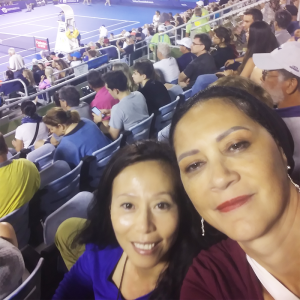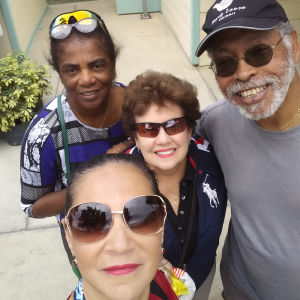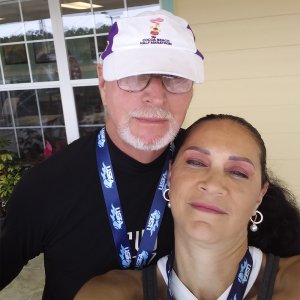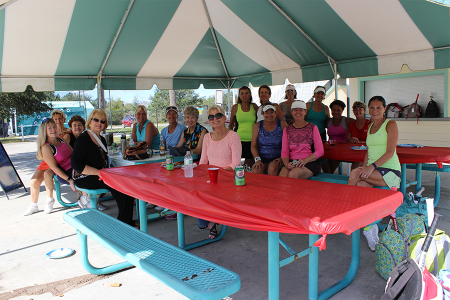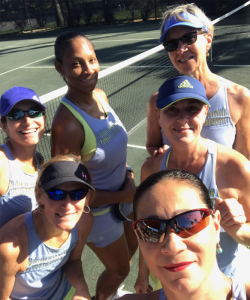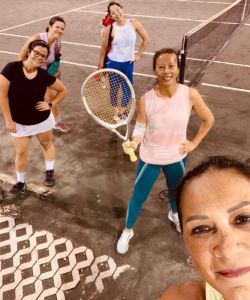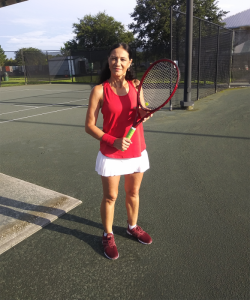Haga clic aquí para la versión en español
In celebration of Hispanic Heritage Month, held Sept. 15 – Oct. 15, USTA Florida will recognize members of Florida’s rich Hispanic community whose talents and dedication help to grow the great game of tennis every day — at every level. We applaud them all for making tennis a better and more inclusive sport, and for making the face of our game more accurately reflect the dynamic diversity of our country.
Milena Fields is an organizer extraordinaire at the Florida Tennis Center in Daytona Beach — and routinely can be found coordinating round-robins or captaining league teams. The soon-to-be 50-year-old says she feels young because she stays active with tennis. Fields was born and raised in Costa Rica and has lived in Daytona Beach for two decades.

Tennis is clearly a big part of your life. When did you first pick up a racquet?
After graduating as a Physical Therapy Assistant from Daytona State College in 2012, I asked my husband Jack to teach me how to play tennis. He’s a very good tennis player and has been a very good instructor. Since I’ve learned how to play, I can’t get enough of it.
What do you love most about tennis?
I normally can’t sit still, and tennis keeps me moving. I’m also competitive with myself. No matter what I do, I want to do it well, and tennis is not the exception. I love running, jumping, chasing balls, sweating and I love the sound of the racquet when I hit the ball correctly. However, what I love the most is the social aspect of tennis. I’ve made many friends, and some of them have actually become very close friends of mine. I encourage a competitive but friendly atmosphere in the groups I organize. We don’t just come to the courts to play — we stop between games and chat about our lives, family and friends. We also go out for lunch and to celebrate birthdays. We had to put this aside because of COVID, but recently, we went out for the first time in over a year and had a great time. To me, playing tennis is physically and emotionally a very healthy sport.
Does your family play tennis?
My husband, my brother and his wife play. My daughter played wheelchair tennis for a short period of time until she got busy with middle school classes. No one else in my family plays tennis. It wasn’t a big sport in Costa Rica, although it’s gaining more popularity there nowadays. My brothers do play soccer, and one of them is a triathlete.
What do you do at the Florida Tennis Center?
I play and organize morning and night time round-robin groups, I captain Greater Volusia Tennis League (GVTL) teams, and I volunteer in some tournaments. The Florida Tennis Center is a city-owned and very well-run club that hosts not only local but state, national and international tournaments. For the past two years, we were able to host an International Juniors tournament despite the pandemic. I led a group of volunteers that conducted health screenings for everyone — players, guests, USTA officials, FTC staff and all volunteers — to ensure a safe environment. In October or November of this year, FTC will be hosting another very important Women’s Pro International tournament.
You’ve been successful in encouraging more Hispanic players to come out and play at the Florida Tennis Center. How did you accomplish that?
I do encourage everyone to play tennis no matter what their heritage is, but my Hispanic roots and my fluency in Spanish have helped me significantly. When I speak in Spanish with a Hispanic person, even if we are both fluent in English, we both feel very familiar and comfortable. We normally have many things in common to talk about, not just tennis. They then feel more welcomed and encouraged to be part of the FTC tennis family.
What is your heritage?
I’m a “Tica”. I was born and raised in Costa Rica — the “Pura Vida” and Spanish-speaking country where many people go surfing, enjoy Central America’s rainforest and the beauty and richness of nature, and even retire.
How has your heritage shaped the person you are today?
Our culture is all about finding any excuse to get together. We support and help each other out, care and pray for each other, share our ups and downs, laugh, dance, eat, and hug. All that is in my blood, and no matter where I am or who I am with, that culture comes out. We were a poor family but were blessed to have good parents that encouraged us to go to school, gave us household chores and responsibilities, taught us to work hard to earn a living and to share what we had with others.
You have an interesting story as to how you came to the U.S. Do you mind sharing that with us?
My daughter Jen has Cerebral Palsy. She underwent extensive surgery on her legs at the age of five at the Shriners Hospital in Tampa, which allowed her to walk for the first time in her life. She started off with a walker and a year later progressed to forearm crutches. She’s now a very sweet, caring and enthusiastic 25-year-old. She has a college degree, a job, and she loves to volunteer.
While we were coming back to America for my daughter’s rehabilitation, I met my husband Jack. He’s American and was learning Latin dance which I love. We became dancing friends and eventually fell in love. We’ve been married for 18 years, and our two biggest passions are dancing and tennis.
Why is it important to celebrate Hispanic Heritage Month in general, as well as in tennis?
Every culture is special in its own way. As the world evolves in science, technology, communication and opportunities, many people like me visit and move to different countries. I feel that the USA is not the only melting pot country anymore. Hispanic culture offers joy, simplicity, family union, food, music and dancing. When we celebrate our Hispanic heritage, we’re not only sharing with other cultures the beauty of our own, but we also have a chance to come together, make new friends, and even learn the differences among Hispanic countries. It brings us back to our roots, it reminds us of who we are and the difficulties we had to overcome to be where we are today. America has given me and my family the opportunity to work and live a decent life, and with that, we can help those back home that are less fortunate.
My tennis friends come from different parts of the world, including Latin America. I know and play tennis with Costa Ricans, Colombians, Mexicans, Puerto Ricans, and more. I think that we are more animated on the courts. We celebrate our wins a little louder, sillier, hugging, and maybe with a dance move.
If you had to share your message of unity, what would it be?
The human race is beautiful, no matter what color, race, gender or status, and no matter where we come from or what abilities or disabilities we have. Let’s open our hearts, let’s learn each other stories. All we want is to love and to be loved.
To learn more about USTA Florida’s diversity initiatives, click here.

